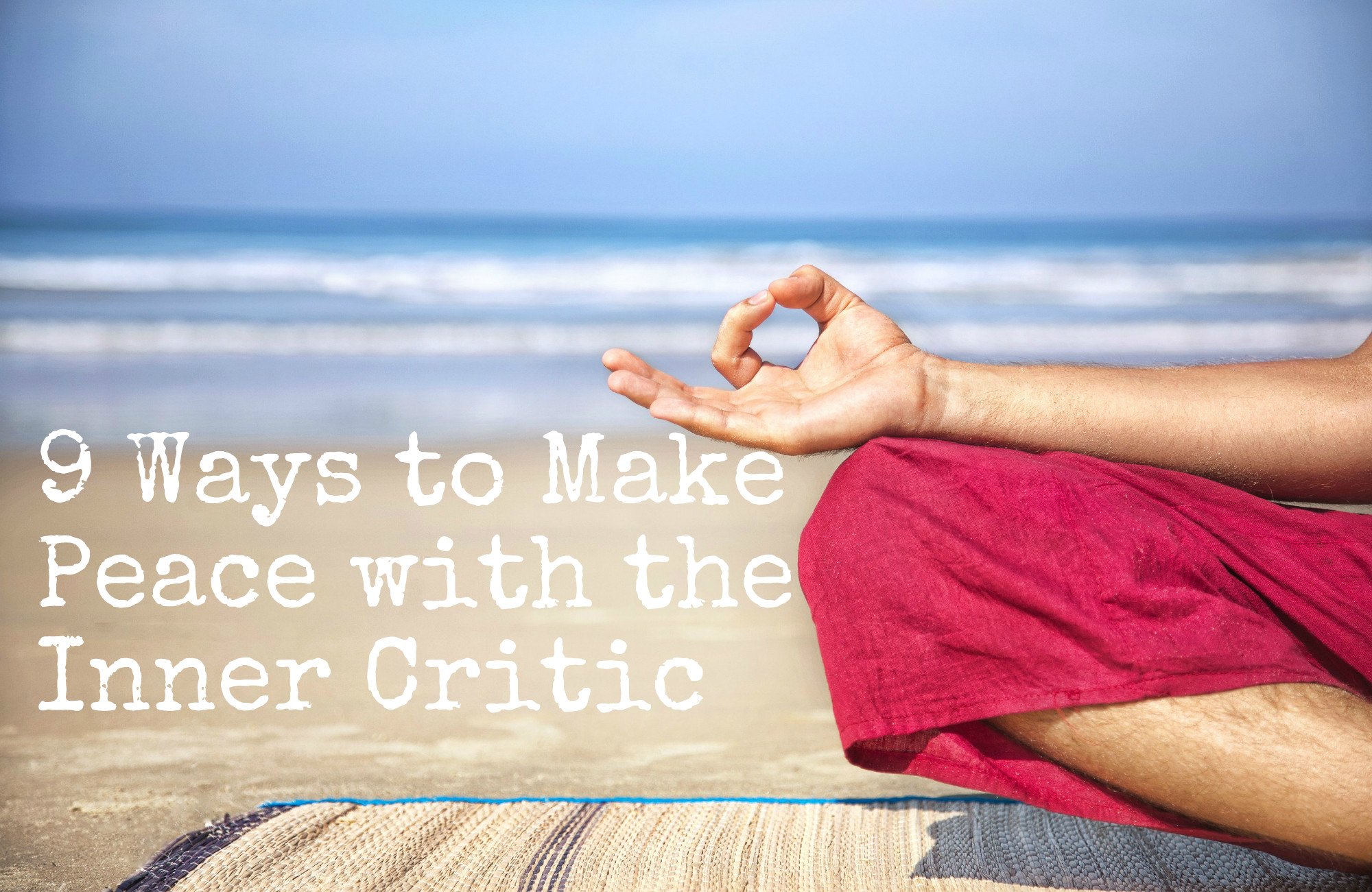
No matter if your creative confidence sings from rooftops or hides in the darkest garret, rise above the rantings of your critical voice and make peace with your inner critic with these techniques.
Speak Kindly to Yourself
“Every time you judge yourself, you hurt yourself,” as Brazilian lyricist and novelist, Paulo Coelho once said, a statement that is true on many levels, and now echoed by science. Neuroscientists found that harsh self-criticism actually increases activity in the brain’s fear centre, the amygdala, activating the sympathetic wing of the nervous system.
Whereas talking to ourselves in a kind, and gentle way supports us, and our creativity. “Self-criticism taps into the threat/defense response,” says Dr. Kristin Neff, author of Self-Compassion and associate professor at the University of Texas. “The system is designed to protect us and keep us safe but when the threat is to our self-concept, you view yourself as the problem the reptilian brain kicks in and attacks yourself.”
In contrast, when we talk to ourselves kindly, especially if in a nourishing voice, we actually alter the nervous system response to one of calm, moving out of the threat/defence system and into a state of safety. “When we criticise ourselves, we reinforce the illusion of control. We really believe that we need self-criticism to motivate ourselves, [but] this is the worst possible mindset in which to do our best,” adds Dr Kristin Neff.
Bypass the Critic with Yoga

“The creative journey is one in which we expose our souls to the world,” says writer and yoga instructor, Karen Macklin. “This can be a tremendously rewarding aspect of being an artist—to have the opportunity to connect with others on a deep yet subtle level. But it is also the reason why emotions like doubt, fear, and self-judgment—emotions that can cripple the creative impulse—are all too familiar to artists.”
One of the many teachings a yoga practice can bring to writers and artists is non-attachment. This is healing in the act of bypassing the inner critic, as we find acceptance in non-attachment, we can just make our art without judgement or attaching ourselves to a specific outcome.
“Whatever your art is, there are those moments of difficulty when it all just looks like garbage, and moments of delusion when it all looks great,” says yoga instructor Kaur Khalsa. “You need a way to ride those ups and downs, and yoga gives you that.” Of course it’s a practice, just as art and writing are practices. Sometimes all we need do is sit in a single Balasana (Child pose) and be. Other times a yoga practice may extend for hours, much like with our writing and creativity.
“Yoga offers a powerful antidote: the practice of vairagya, or non-attachment. This principle teaches us to let go of expectations by diligently observing the mind without reacting to, clinging to, or rejecting anything,” says Karen Macklin. “We begin to recognize that our negative emotions are not permanent truths, and we can more easily allow them to dissolve when they come up in the creative process.”
Be On Your Own Side

“We never win an argument with our inner critics because when we argue with our inner critic, we just fuel it and bolster its power,” says Tara Mohr, author of Playing Big: Find Your Voice, Your Mission, Your Message. “Because arguing means we aren’t focusing on fulfilling our dreams, speaking our voices and nurturing ourselves. Ultimately, because we don’t ever want to make a part of us the enemy, to go to war with a part of ourselves.”
Sometimes we are critical of ourselves because we want to do better, for that criticism to motivate change. The problem is that it doesn’t motivate us but instead makes us feel worse on every level. “Our inner critic has a long list of reasons why there’s something wrong with us, and it’ll just keep going down that list,” says Tara Mohr.
You have to be on your own side, even that part of you who doubts and criticises. As author Elizabeth Scott so aptly said, “The world will knock you down plenty. You don’t need to be doing it to yourself.” When we are self-critical, it’s frequently in the voice of someone, such as a parent or a teacher, who was critical to us. We may not recognise it as such but still use that voice as a motivator but it will never motivate us — these ancient techniques, however, will motivate you, and in far kinder ways.
Perk Up and Lean In

“The most fundamental aggression to ourselves, the most fundamental harm we can do to ourselves, is to remain ignorant by not having the courage and the respect to look at ourselves honestly and gently,” says Pema Chödrön in her book, When Things Fall Apart: Heart Advice for Difficult Times.
Each time you experience uncomfortable feelings, Pema suggests leaning into them, learning from them, seeing them as potent reminders for presence, as sign-posts in the direction of your own evolution.
Create Distance from Critical Thoughts

Despite the importance we place on them, our thoughts are not necessarily truthful or even meaningful. Labelling critical thoughts by prefixing a phrase in front of the thoughts can help you detach from them. Psychologist Dr Russ Harris, author of ‘The Happiness Trap’ suggests using the phrase:
“I’m having the thought that…” or “I’m noticing the thought that…” So for example, “I can’t do this,” becomes “I’m having the thought that I can’t do this.” When you do this, you are then able to recognise that it is just a thought and trigger for a whole set of unhelpful emotions that only serve to keep you trapped in this negative cycle and hinder your creativity.
We don’t have to believe these thoughts or even act on them. In being mindful of our inner landscape and the critical thoughts we default to, we can instead observe them without engaging with them, and therefore stop seeing them as immutable truths that hamper our creativity and self-confidence too.
Make Peace with Self-Criticism

Choose to make peace with the critic. It may be irritating, it may hamper the delicate creative process and flow but instead of allowing your frustration to well up, make peace with it, even friends with it. “It helps to think of that inner censor as a beloved but annoying friend who has moved in for the duration,” says Dani Shapiro.
“That friend is never going away. So you make peace with your inner censor. You say some version of, thanks very much for sharing, and then move on, past that censoring voice, and into your work.” There’s little point in trying to debate with the critic. It will always be there, saying this is nonsense but in making peace with it, you can override it and create.
Your Criticism as a Story

Marshal Rosenberg, author of Non-Violent Communication, calls self-criticism the ‘tragic expression of an unmet need’, as it makes us feel awful without motivating any positive change. This technique from ACT (Acceptance and Commitment Therapy) can be very useful for releasing critical thinking:
- The first step is to be aware of what you are thinking, so if you have a repetitive critical thought focus on that. When you stop to notice what your mind is actually saying it creates a space between you and your thoughts, and in that distance, gives you a choice in how you respond.
- The second step is to name the thought as the ‘story’ it is. For example, “here’s the my-novel-is-rubbish ‘story’,” or “here’s the I’m hopeless at writing ‘story’ again. The thought may still exist but you are less caught up by it, distanced, instead able to see it for what it is, a story you tell yourself with little basis on truth.
Have Compassion for the Critic

Instead of battling your own inner critic, research shows that self-compassion techniques are as effective as meditation. Be supportive of yourself, encouraging. Though the internal critic may inevitably try to hamper your progress, have compassion for yourself.
Often our own mental scolding of ourselves has more to do with self-protection than criticism. “Self-criticism comes from a desire to keep ourselves safe. We have to have compassion for the self critic. So we first have to have compassion for the critical voice. The self-critical voice needs to be heard, and then paradoxically it can quiet down. Then you can bring in self-compassion techniques,” says Dr. Kristin Neff.
“One of the main components of compassion is being able to recognise in the moment when you’re suffering. You can say to yourself, “I want to keep you safe too, but I want to do it in a more effective way.” We have these skills that we use for our friends or our children. We just have to remember to do it for ourselves, be kind to this part of ourselves, because at some level it has our best interests at heart.” Respond with self-compassion, be kind to yourself, and gently bring yourself back to the moment.
Return to Awareness

“When you experience judgment or perfectionism or self-criticism, it’s just another thing to notice,” says meditation teacher and yoga instructor, Sean Feit. “If we notice it, it starts to lose its power. That’s one of the things that the yoga practices can teach us as artists: to bypass the judge and just make the thing and let the chips fall as they may.”
Maintaining an awareness of the cycles and patterns in your thoughts can help you find the solutions to return to a calmer internal equilibrium. “It’s amazing how much negative self-talk goes on just under your awareness,” says Dr. Kristin Neff.
Whenever practicing a new belief or technique, there will be moments where things slip up but in always returning to awareness — of where you are this moment, where you want to be — and having compassion, never mentally scolding yourself if your ideals and reality are not yet in sync — is the most healing approach.
Be supportive of yourself, encouraging and compassionate. Talk to yourself kindly instead of critically. Even if the internal critic inevitably tries to hamper your progress or justify its criticism, instead of believing this internal chitchat or engaging with the negative thoughts, return to the moment and keep going. Keep creating.
FEEL FREE TO SHARE THE LOVE ♥
P.S. Sign-up to my newsletter should the mood take you, Namaste ♥
Creative Risk Taking and How it Relates to Self-Esteem – Creative Katrina
The Art of Constructive Self-Criticism




The peace you find in yourself, is the ultimate freedom you will ever have. We should be own critics. Nobody can praise us better than we do. We should not always judge ourselves by what people say about us. I like what Dr. Kristin Neff. said that “It’s amazing how much negative self-talk goes on just under your awareness”
So true, Diva. I think until we notice it, that is take a metaphorical step back and see how much we are affecting our own experience of life, it becomes like background music (only far more weighty on the soul). Compassion, and self-compassion especially are so healing and necessary for our world too.